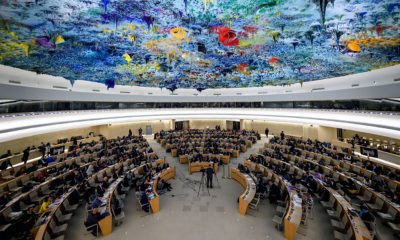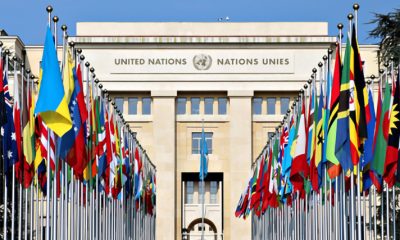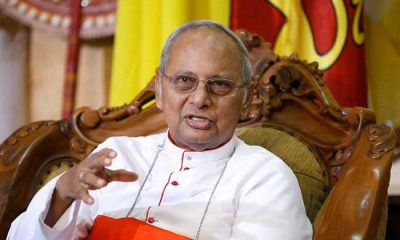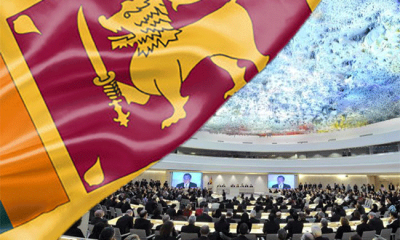News
India, too, should be investigated -Int’l HR organisations
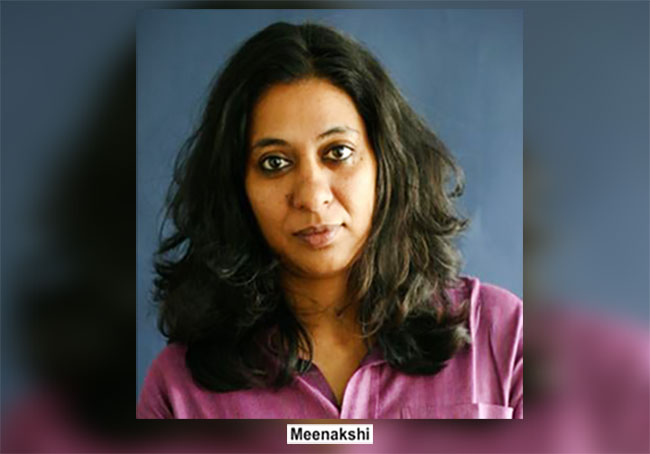
Geneva resolution:
By Shamindra Ferdinando
Four international human rights organisations yesterday (20) said that atrocities perpetrated during the deployment of the Indian Army in Sri Lanka, too, should be properly investigated by the mechanisms proposed by the Geneva-based United Nations Human Rights Council (UNHRC).
Sri Lanka brought the war to a successful conclusion in May 2009.
London-based Meenakshi Ganguly said that they sought a strong resolution on Sri Lanka to address all international crimes, including those that occurred during the conflict. “Indian troops had been deployed at the invitation of the then Sri Lankan government to enforce a truce agreement, and the abuses that occurred at that time should be properly investigated and those responsible held to account.
Ganguly said so when The Island sought their stand as regards India’s accountability. The Island asked her whether she believed the latest Geneva Resolution should also address India’s accountability as the Indian Army, too, had been accused of atrocities during its deployment in Northern and Eastern parts of Sri Lanka (July 1987-March 1990) and India having sponsored half a dozen terrorists groups in Sri Lanka?
The 51 regular sessions of the UNHRC are underway.
Ganguly responded on behalf of South Asia Regional Director, Amnesty International, Programme Manager, UN Advocacy, Asian Forum for Human Rights and Development (FORUM-ASIA), Human Rights Watch and UN Representative & Senior Legal Adviser, International Commission of Jurists.
However, Lucy McKernan, Acting Geneva Director, Human Rights Watch didn’t respond to The Island query.
Sri Lanka Core Group led by the UK has submitted a new resolution demanding punitive action against Sri Lanka. Former Minister and leader of Pivithuru Hela Urumaya (PHU) Udaya Gammanpila on Monday warned that Sri Lanka could lose the vote on the new resolution by a big margin in the 47-member council. The PHU leader warned that it could be tied to aid to Sri Lanka.
The four international human rights groups declared that the UNHRC should adopt a strong resolution that strengthened current UN mandates on accountability for crimes under international law and monitor Sri Lanka’s deteriorating human rights situation. They emphasized that the resolution should also request Sri Lanka to address the ongoing abuses, including by ending use of the draconian Prevention of Terrorism Act.
Asked whether the Indian intervention, too, should be investigated by Geneva, the Global Tamil Forum (GTF) spokesperson Suren Surendiran said that “Root causes why the Tamil youth took up arms in 1983 thirty five years after independence, Tamil political leaders tried their best to resolve through political negotiations the inequality, blatant discrimination and treatment of Tamils as second class citizens through constitutional means by successive Sinhala leaderships in the south should/must be publicly established. If part of that investigation should include the Indian involvement, so be it.”
Surendiran said that “Truth seeking mechanism is one of the four transitional justice pillars. Therefore, it is an important initiative. However, just by itself will not resolve or be accepted as part of serving justice to victims. Addressing accountability through a credible international mechanism needs to be part of the program. That’s what resolution 30/1 was going to address. However, successive governments of Sri Lanka keeps deferring or intentionally avoiding addressing this very point. Hence the resolution 46/1 went with the recommendations of the High Commissioner to address accountability via collecting and preserving evidence and serving justice through other international mechanisms including, universal jurisdiction.
“We know how pathetically successive governments have tried to hoodwink the international community by a half-baked Office of Missing Persons (OMP) and other reparation ideas.
“Until Sri Lanka acknowledges that international laws were breached during the war, especially at the end of the war, and charges persons who had command responsibility including the then political and civil service leaders, there will not be any let up by the international community. This is not just to punish for the alleged crimes committed but to ensure that there won’t be any such breaches of international law elsewhere in the world in the future.”
News
US sports envoys to Lanka to champion youth development

The U.S. Embassy in Colombo welcomed the U.S. Sports Envoys to Sri Lanka, former National Basketball Association (NBA) and Women’s National Basketball Association (WNBA) players Stephen Howard and Astou Ndiaye, from June 8 through 14.
The Public Diplomacy section of the U.S. Embassy said that it would launch a weeklong basketball program intended to harness the unifying power of sports, made possible through collaboration with Foundation of Goodness and IImpact Hoop Lab.
While in Sri Lanka, Howard and Ndiaye, both retired professional basketball players, will conduct a weeklong program, Hoops for Hope: Bridging Borders through Basketball. The Sports Envoys will lead basketball clinics and exhibition matches and engage in leadership sessions in Colombo and Southern Province for youth aged 14-18 from Northern, Uva, Eastern and Western Provinces, offering skills and leadership training both on and off the court. The U.S. Envoys will also share their expertise with the Sri Lanka Basketball Federation, national coaches, and players, furthering the development of basketball in the country. Beyond the clinics, they will collaborate with Sri Lankan schoolchildren to take part in a community service project in the Colombo area.
“We are so proud to welcome Stephen and Astou as our Sports Envoys to Sri Lanka, to build on the strong people-to-people connections between the United States and Sri Lanka,” said U.S. Ambassador Julie Chung. “The lessons that will be shared by our Sports Envoys – communication, teamwork, resilience, inclusion, and conflict resolution – are essential for leadership development, community building, equality, and peace. The U.S. Sports Envoy program is a testament to our belief that sports can be a powerful tool in promoting peace and unity.”
News
Rahuman questions sudden cancellation of leave of CEB employees

SJB Colombo District MP Mujibur Rahuman in parliament demanded to know from the government the reasons for CEB suspending the leave of all its employees until further notice from Thursday.
MP Rahuman said that the CEB has got an acting General Manager anew and the latter yesterday morning issued a circular suspending leave of all CEB employees with immediate effect until further notice.
“We demand that Minister Kanchana Wijesekera should explain this to the House. This circular was issued while this debate on the new Electricity Amendment Bill was pending. There are many who oppose this Bill. The Minister must tell parliament the reason for the urge to cancel the leave of CEB employees,” the MP said.However, Speaker Mahinda Yapa Abeywardena prevented Minister Wijesekera responding to the query and said that the matter raised by MP Rahuman was not relevant.
News
CIPM successfully concludes 8th Annual Symposium

The Chartered Institute of Personnel Management (CIPM) successfully concluded the 8th Annual CIPM Symposium, which took place on 31st May 2024. Themed “Nurturing the Human Element—Redefining HRM in a Rapidly Changing World,” the symposium underscored the pivotal role of human resource management (HRM) in today’s dynamic global landscape. Since its inception in 1959, CIPM has been dedicated to advancing the HR profession through education, professional development, and advocacy, solidifying its position as Sri Lanka’s leading professional body for HRM.
Ken Vijayakumar, the President of the CIPM, graced the occasion as the chief guest. The symposium commenced with the welcome address by the Chairperson, Prof. Arosha Adikaram, followed by the Web Launch of the Symposium Proceedings and Abstract Book by the CIPM President. The event featured distinguished addresses, including a speech by Chief Guest Ken Vijayakumar, President of CIPM, and an address by Guest of Honor Shakthi Ranatunga, Chief Operating Officer of MAS Holdings Pvt. Ltd., Sri Lanka.
The symposium also featured an inspiring keynote address by Prof. Mario Fernando, Professor of Management and Director of the Centre for Cross Cultural Management (CCCM) at the University of Wollongong, Australia.
Vote of Thanks of the inauguration session was delivered by Dr. Dillanjani Weeratunga, Symposium Co-chair.
The symposium served as a comprehensive platform for researchers to present their findings across a wide range of critical topics in HRM. These included Cultural Diversity and Inclusion, Talent Development and Retention, Ethical Leadership and Corporate Social Responsibility, Adapting to Technological Advancements, Mental Health and Well-being at Work, Global Workforce Challenges, Employee Empowerment, and Reskilling and Upskilling.
The plenary session was led by Prof. Wasantha Rajapakse. Certificates were awarded to the best paper presenters during the valedictory session, followed by a vote of thanks delivered by Kamani Perera, Manager of Research and Development.
The annual symposium of CIPM was a truly inclusive event, attracting a diverse audience that spanned undergraduates, graduates, working professionals, research scholars and lecturers. This widespread interest highlights the symposium’s significance in the field of HRM, offering a unique opportunity for everyone to network and learn from scholarly brains.The CIPM International Research Symposium was sponsored by Hambantota International Port, Sri Lanka Institute of Information Technology (SLIIT), E B Creasy & Co. PLC, and Print Xcel Company.


